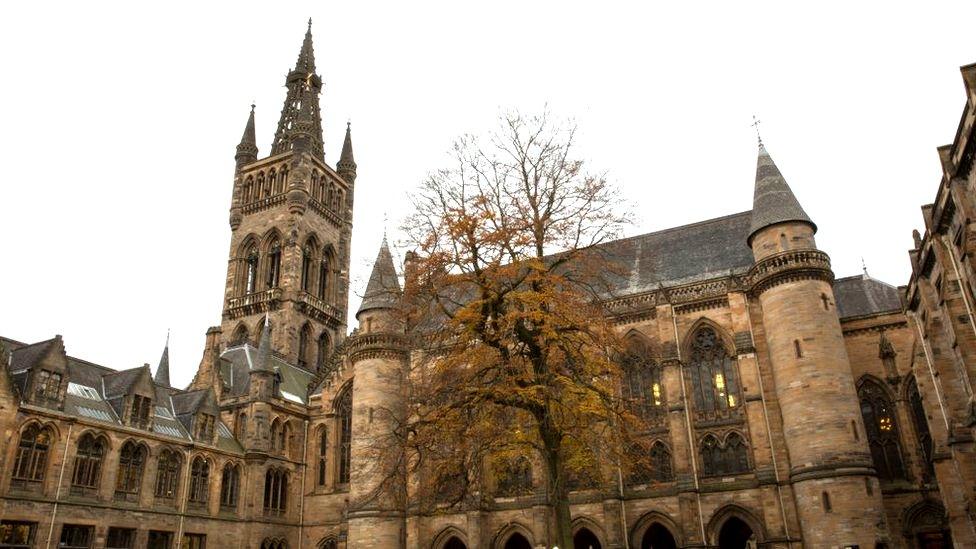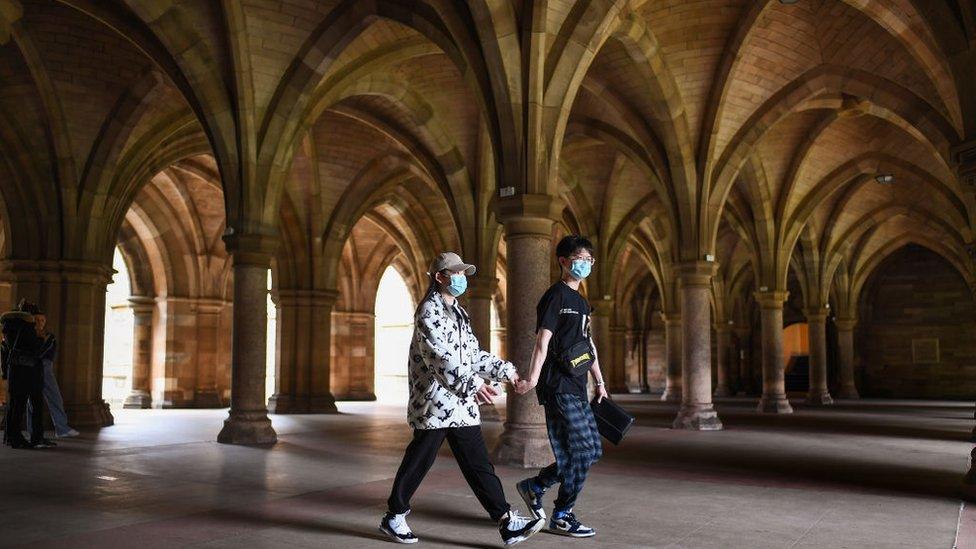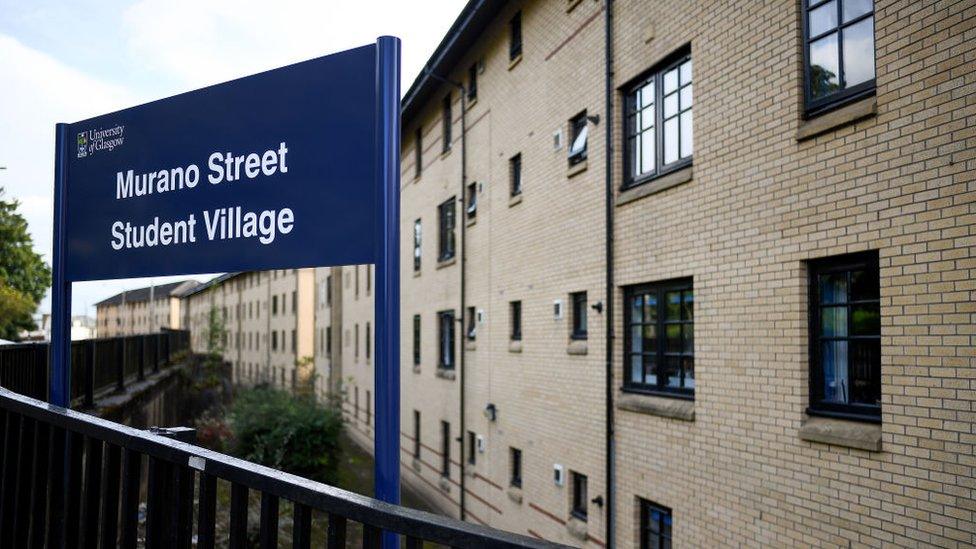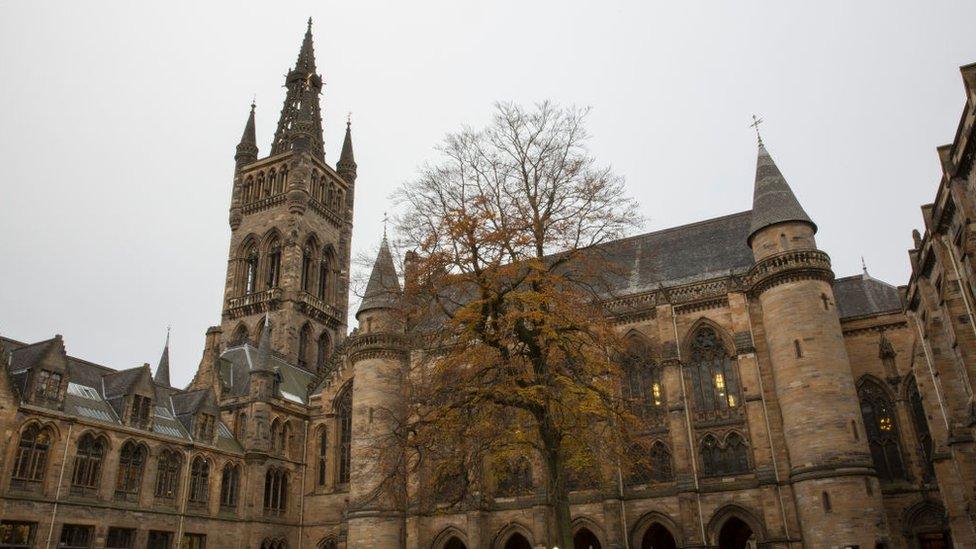Universities profited from overseas students during Covid - report
- Published

The University of Glasgow doubled its intake of overseas students
Scottish universities profited more than expected during Covid by "substantially expanding international student numbers", a report suggests.
The study by a University of Glasgow professor says most of the fee-paying overseas students came from Asia and Africa.
It found that Glasgow university increased its income and student numbers faster than other institutions.
The university has disputed the contents of the report.
It said they were inaccurate and "wilfully misleading".
The report by Prof Sarah Armstrong, of the Scottish Centre for Crime and Justice Research, found that all Scottish universities grew by enrolling more fee-paying overseas students during the pandemic.
It found that the number of overseas admissions at the University of Glasgow more than double between 2019 and 2022.
International tuition fees can range from £22,000 to nearly £50,000 pounds per year, depending on the degree course and level of study.
The report warned that fees from overseas students were increasingly becoming a "primary source of income" for Scottish universities.
It found that Scottish universities earned £1.7bn from international tuition fees in 2021 and 2022.
The University of Edinburgh made £608m and the University of Glasgow made £482m.
This means that the two universities received the majority (65%) of all international tuition fees in Scotland over that time period, according to the data.

Glasgow University made more profits than expected during the pandemic
Prof Armstrong raised issues around depending financially on a "single, unpredictable source" in the report.
She said that this income was also distributed unequally across the universities in Scotland, as some institutions recruit far more international students than others.
The report found that all of Scotland's larger universities recruited and admitted more overseas students during the pandemic than they had before.
And it claims the University of Glasgow has "pursued expansion of international student numbers and income more aggressively than most HEIs".
But the university said this was "fundamentally untrue".
It argued that it could not know that student applications and offer acceptances for World Top 100 universities would increase "significantly while they dropped in other parts of the sector".
And like some other universities during the pandemic, Glasgow rolled out a dual start model which allowed students to begin their studies at two points in the year.
It argues that these factors led to increased tuition fee income, but it was not deliberately pursued.
On top of tuition fees, universities profit from student accommodation and catering.
International students can also rack up costs by accessing pre-course preparation programmes, such as the University of Glasgow's partnership with Kaplan International.
These provide pathways for students from international educational systems to prepare for their studies at Scottish universities.

The University of Glasgow houses thousands of students in university accommodation
But the University of Glasgow pointed to financial help available, as well as noting that international students are able to access higher education in the UK via some form of government scholarship.
Prof Armstrong, who has taught at the university, said increasing student numbers had led to larger class sizes which impact learning experiences, as well as issues around providing enough university accommodation.
She told BBC Radio Scotland's Good Morning Scotland programme: "In the English universities there is the Office for Students, which is an independent regulator of higher education, which wrote to 23 English universities, warning them that they relied too much on international students.
"Now Glasgow and Edinburgh have more international students than 21 of those universities. So that is quite concerning to me that there is little public discussion, little scrutiny and little oversight of what is happening."
Her report raised questions around the ethics of the high costs for international students accessing a prestigious university education in the UK.
The report stated the data should not be "misleadingly appropriated to feed racist, politically right-wing narratives (and behaviour) about declining educational opportunities for Scottish-based students".
It said: "The numerous universities in Scotland mean home students have many options; the takeaway from this analysis should focus on the overall growth and shifting balances between and within Scottish universities as a starting point to consider its implications for learning and working environments.
"Inequality among universities themselves is one place to start, where some universities are drawing the lion's share of the highest paying students."
'Serious misrepresentation'
The University of Glasgow said it was planning for much lower levels of growth over the next four years to offset the changes during the Covid period.
A spokesman said: "The serious misrepresentation within this report appears to be designed to undermine and denigrate the tireless and dedicated work of students and staff, rather than it being a serious analysis of higher education performance during and post Covid."
He said the report's "many assumptions are unfounded, its data flawed and its findings inaccurate" and the university did not actively pursue expansion during the pandemic period.
He added that the report "only serves to fuel prejudices, particularly against our international students, rather than balanced debate".
But Prof Armstrong said the data in the analysis "is entirely based on public data that is reported by universities themselves to the Higher Education Statistics Authority".
A Universities Scotland spokesman told BBC Scotland that financial warnings at the start of the pandemic were accurate, and it was unfair to suggest this was overstated.
He said: "When the circumstances changed, which they did at various stages of the pandemic, the sector's financial position changed and this was reflected in our communications."
He added that there were still financial health issues across the sector in Scotland due to "systemic underfunding of universities' contribution".
- Published18 November 2022
